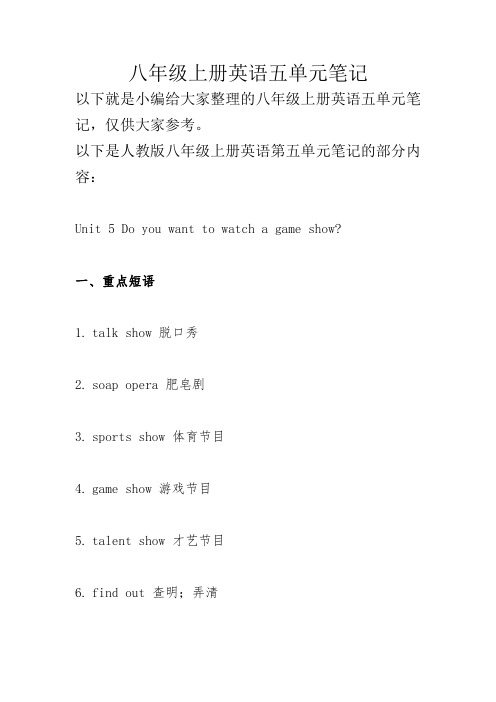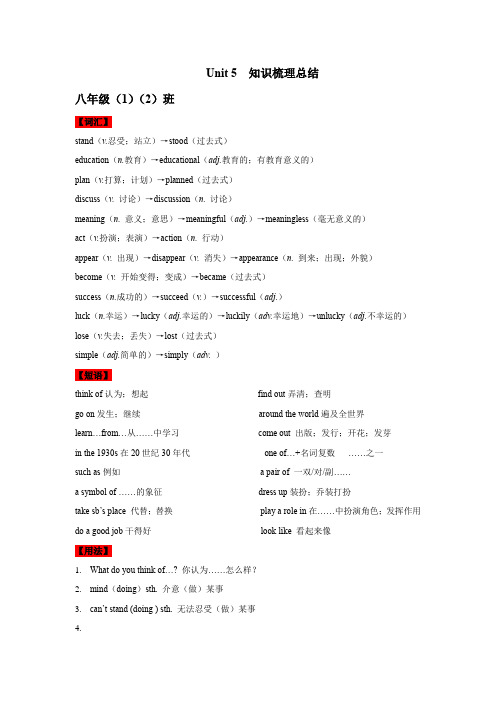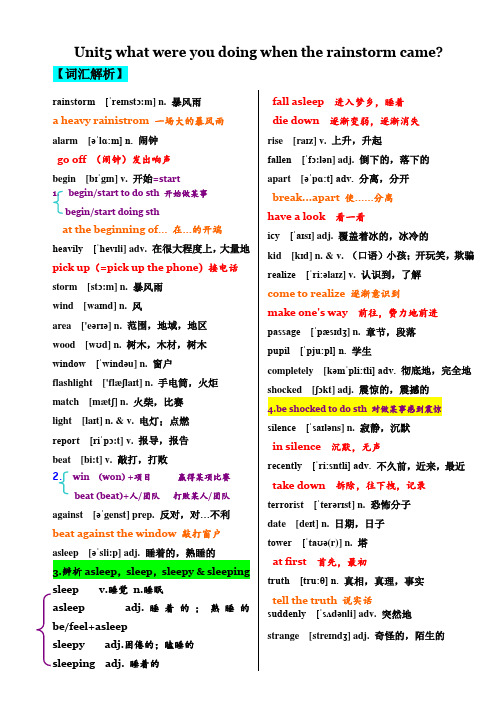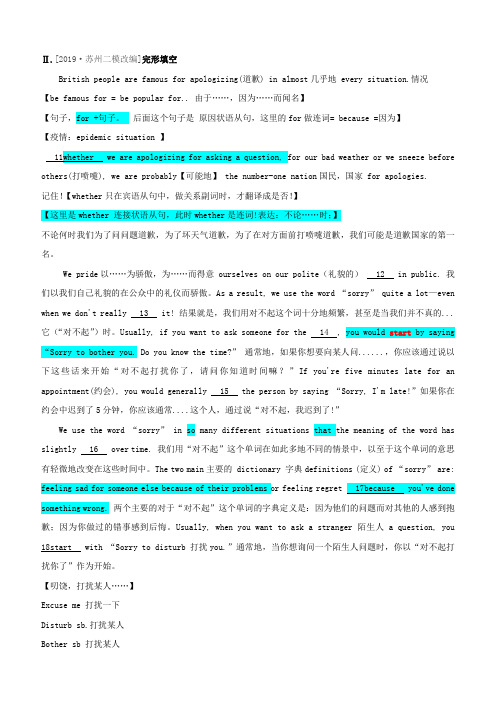人教版八年级英语笔记unit5
八年级上册英语五单元笔记

八年级上册英语五单元笔记以下就是小编给大家整理的八年级上册英语五单元笔记,仅供大家参考。
以下是人教版八年级上册英语第五单元笔记的部分内容:Unit5Do you want to watch a game show?一、重点短语1.talk show脱口秀2.soap opera肥皂剧3.sports show体育节目4.game show游戏节目5.talent show才艺节目6.find out查明;弄清7.go on发生8.have a discussion about就……讨论9.expect to do sth.期望做某事10.one day有一天11.such as例如12.a symbol of的象征13.something enjoyable令人愉快的东西14.interesting information有趣的信息15.plan to do sth.计划/打算做某事16.hope to do sth.希望做某事17.happen to do sth.碰巧做某事18.expect sb.to do sth.期望某人做某事19.be ready to do sth.乐于做某事20.try one’s best to do sth.尽力做某事二、重点句型1.What do you think of talk shows?你认为脱口秀怎么样?2.I don't mind them.我不介意它们。
3.I can't stand them.我不能忍受它们。
4.Because I hope to find out what's going on around the world.因为我希望了解世界各地发生的事。
5.I like to follow the story and see what happens next.我喜欢跟随故事情节,看看接下来会发生什么。
6.I don't mind soap operas.我不介意肥皂剧。
人教版英语八下unit5笔记

人教版英语八下unit5笔记人教版英语八下unit5笔记一、词汇1. conduct: vt. 进行;组织;实施例句:He conducted a thorough investigation into the matter.2. argument: n. 争论;争吵;论点例句:They had an argument over the choice of restaurant.3. via: prep. 通过;经由;途径例句:You can get there via train or bus.4. mumble: v. 咕哝;含糊不清地说话例句:He mumbled an apology and left the room.二、重点语法该单元的语法重点为宾语从句,即由that或whether引导的从句作为动词或介词的宾语。
举例:1. She thinks that I should study harder.2. He is not sure whether he can make it to the meeting on time.3. The teacher explained that the test would be difficult.需要注意的是,当主句的主语和从句的主语相同时,宾语从句可以省略主语和be动词,例如:I think (that) he is a good student. = I think he is a good student.三、重要知识点该单元的重要知识点为讨论技巧,主要包括争论的步骤和技巧。
争论的步骤:1. 确定争论的问题;2. 阐述各自的观点;3. 提出证据支持自己的观点;4. 回应对方观点的反驳;5. 总结讨论,得出结论。
争论的技巧:1. 保持冷静并尊重对方的意见;2. 清晰准确地表达自己的观点;3. 寻找和展示证据;4. 有效地回应反驳,并提出反驳对方观点的论据;5. 结合事实论证自己的观点;6. 最终解决问题,达成共识。
Unit5笔记人教版英语八年级上册

Unit 5 知识梳理总结八年级(1)(2)班【词汇】stand(v.忍受;站立)→stood(过去式)education(n.教育)→educational(adj.教育的;有教育意义的)plan(v.打算;计划)→planned(过去式)discuss(v. 讨论)→discussion(n. 讨论)meaning(n.意义;意思)→meaningful(adj.)→meaningless(毫无意义的)act(v.扮演;表演)→action(n. 行动)appear(v.出现)→disappear(v.消失)→appearance(n. 到来;出现;外貌)become(v.开始变得;变成)→became(过去式)success(n.成功的)→succeed(v.)→successful(adj.)luck(n.幸运)→lucky(adj.幸运的)→luckily(adv.幸运地)→unlucky(adj.不幸运的)lose(v.失去;丢失)→lost(过去式)simple(adj.简单的)→simply(adv.)【短语】think of认为;想起find out弄清;查明go on发生;继续around the world遍及全世界learn…from…从……中学习come out 出版;发行;开花;发芽in the 1930s在20世纪30年代one of…+名词复数……之一such as例如 a pair of 一双/对/副……a symbol of ……的象征dress up装扮;乔装打扮take sb’s place 代替;替换play a role in在……中扮演角色;发挥作用do a good job干得好look like 看起来像【用法】1.What do you think of…? 你认为……怎么样?2.mind(doing)sth. 介意(做)某事3.can’t stand (doing ) sth. 无法忍受(做)某事4.5.expect to do sth.期待做某事expect sb. to do. sth. 期待某人做某事6.try one’s best尽某人最大的努力7.be ready to do sth. 准备好做某事;愿意做某事8.see sb. do 看到某人做某事see sb. doing 看到某人正在做某事9.as+ adj/adv. + as 和……一样…not as/so as adj/adv. + as 不像……那样【Language points】1.show ①【可数名词】(电视或广播的)节目talk show 访谈节目②【名词】表演;展览on show 在展出;在展览中2.I don’t mind them. 我不介意它们。
八年级英语重点笔记人教版

八年级英语重点笔记人教版Unit 1:Where did you go on vacation?重点单词:vacation, delicious, crowded,决定,尝试,拥挤的,美丽的,放松的重点句子:1、I went to the beach and saw some interesting animals.2、I feel more relaxed after a vacation.3、We visited some interesting places during the vacation.Unit 2:How often do you exercise?重点单词:how often, once a week, twice a day, hardly ever, result, online, question, effort 重点句子:4、How often do you watch TV?5、I usually exercise three times a week.6、Watching TV for too long can be harmful to your health.Unit 3:I'm more outgoing than my sister.重点单词:outgoing, quiet, carefully, carelessly, carefully, wildly, loudly, bravely重点句子:7、I'm more outgoing than my friend.8、She is more careful than me in her work.9、He sings more loudly than anyone else in his class.Unit 4:What's the best movie theater?重点单词:comfortable, cheap, crowded, bad, close to home, screen, sound, equipment 重点句子:10、What is the best movie theater in the city?11、The movie theater that has the biggest screen is the best.12、The movie theater that has the most comfortable seats is the best.Unit 5:Do you want to watch a game show?重点单词:boring, discussion, educational, plan, stand, expect, mind, hope重点句子:13、I don't mind watching a game show.14、I expect to watch a news program.15、I hope to see a talk show.Unit 6:I'm going to study computer science.重点单词:pilot, engineer, teacher, doctor, cook, lawyer, secretary, pilot重点句子:16、What do you want to be when you grow up?17、I'm going to be a doctor.18、I want to be a teacher because I like working with children.Unit 7:Will people have robots?重点单词:possible, impossible, human, future, environment, pollution, space, other 重点句子:19、It is possible that we will live to be 100 years old in the future.20、It is impossible for us to travel to the moon in the future.21、We need to protect the environment and reduce pollution.Unit 8:How do you make a banana milk shake?重点单词:ingredient,peel,pour,yogurt,honey,enjoy,cut,blender 重点句子:22、How many bananas do we need for the banana milk shake?23、First peel the bananas and cut them into pieces.24、Then pour the milk into the blender and add the bananas and yogurt.25、Finally add honey and blend the mixture until it is smooth.26、Enjoy your banana milk shake!。
人教版新目标初中英语八年级下册Unit5学霸笔记

Unit5 what were you doing when the rainstorm came?【词汇解析】rainstorm [ˈreɪnst ɔ:m] n. 暴风雨 a heavy rainistrom 一场大的暴风雨 alarm [əˈl ɑ:m] n. 闹钟 go off (闹钟)发出响声 begin [b ɪˈg ɪn] v. 开始=startfall asleep 进入梦乡,睡着 die down 逐渐变弱,逐渐消失 rise [ra ɪz] v. 上升,升起fallen [ˈfɔ:l ən] adj. 倒下的,落下的 apart [əˈp ɑ:t] adv. 分离,分开 break...apart 使……分离 have a look 看一看icy [ˈaɪs ɪ] adj. 覆盖着冰的,冰冷的kid [k ɪd] n. & v. (口语)小孩;开玩笑,欺骗 realize [ˈri:əla ɪz] v. 认识到,了解 come to realize 逐渐意识到 make one's way 前往,费力地前进 passage [ˈpæsɪd ʒ] n. 章节,段落 pupil [ˈpju:pl] n. 学生completely [k əmˈpli:tli] adv. 彻底地,完全地 shocked [ʃɔkt] adj. 震惊的,震撼的4.be shocked to do sth 对做某事感到震惊silence [ˈsaɪl əns] n. 寂静,沉默 in silence 沉默,无声recently [ˈri:sntli] adv. 不久前,近来,最近 take down 拆除,往下拽,记录 terrorist [ˈterər ɪst] n. 恐怖分子 date [de ɪt] n. 日期,日子 tower [ˈtaʊə(r)] n. 塔 at first 首先,最初truth [tru:θ] n. 真相,真理,事实 tell the truth 说实话suddenly [ˈsʌd ənli] adv. 突然地 strange [stre ɪnd ʒ] adj. 奇怪的,陌生的重点句型be busy with sth 忙于(做)某事2.see sb doing sth 看见某人或某物正在做某事3. remember doing sth. 记得做过某事remember to do sth. 记得做某事(没做)4. .wait for sb. to do sth. 等待某人干某事5. make one’s way to.sp. 在某人去某地的路上6.have meaning to sb. 对某人有意义✿本单元重点✿(过去进行时)一.定义:表示在过去某一时刻或某一时间段内正在进行或发生的动作。
人教版英语八年级上册Unit5【重点短语+词法语法句法精讲】

【课堂笔记】人教版英语八年级上册Unit5重点短语1. watch a talk show/talkshows 看脱口秀(谈话节目)2. mind sth./doing sth.介意某事(物)/介意做某事3. can't stand news 无法忍受新闻stood(stand的过去式)4. can't stand doing sth. 无法忍受做某事5. find out 查明;弄清6. have a discussion aboutsth.关于某事进行一次讨论7. learn some great jokesfrom sitcoms 从情景喜剧中学到一些很棒的笑话. more educational 更有教育意义的9. think of 想到;认为10. plan to watch a sportsshow打算看一个体育节目11. watch cartoons/action movies/ soap operas/sports shows/ comedies看动画片/动作片/肥皂剧/体育节目/喜剧12. expect to do sth. 期待做某事13. more meaningless 更加无意义的14. scary movies 恐怖片15. in American culture 在美国文化里16. one of the most famous symbols最著名的象征之一17. the black mouse with two large round ears 长着两只又大又圆耳朵的黑色老鼠1. over 0 years ago 0多年前19. come out(书、电影等)出版;发行20. the first cartoon with sound and music第一部有声配乐的动画片21. become very rich and successful变得非常富有和成功became(become的过去式)22. in the 1930s 在20世纪30年代23. make cartoons 拍动画片24. be like a common man 像一个普通人25. in his early films 在他的早期电影中26. have many problems such as losing his house or girl fri有很多麻烦比如失去他的房子或女朋友27. cartoon characters 卡通角色2. have problems doing sth. 做某事有困难29. one of the main reasons主要原因之一30. face danger 面对危险31. get/be ready to do sth.准备做某事32. try one's best to do sth.尽某人最大努力做某事33. not as/so simple as... 不像……那样简单simpler, simplest(simple的比较级与最高级)34. a symbol of Chinese culture中国文化的一个象征35. dress up 乔装打扮36. take one's place 代替某人37. do a good job 干得好3. fight in the army 在军中打仗39. show her love for her family, fris and country 表达了她对家人、朋友和国家的爱40. see something enjoyable看点令人愉快的东西重点句型1. I hope to find out what's going on around the world.我希望弄清现在世界上正在发生什么。
人教部编版八年级上学期英语第五单元unit5辨析笔记(教材重难点讲解)

Ⅱ.[2019·苏州二模改编]完形填空British people are famous for apologizing(道歉) in almost几乎地 every situation.情况【be famous for = be popular for.. 由于……,因为……而闻名】【句子,for +句子。
后面这个句子是原因状语从句,这里的for做连词= because =因为】【疫情:epidemic situation 】others(打喷嚏), we are probably【可能地】 the number-one nation国民,国家 for apologies.记住!【whether只在宾语从句中,做关系副词时,才翻译成是否!】【这里是whether 连接状语从句,此时whether是连词!表达:不论……时;】不论何时我们为了问问题道歉,为了坏天气道歉,为了在对方面前打喷嚏道歉,我们可能是道歉国家的第一名。
We pride以……为骄傲,为……而得意 ourselves on our polite(礼貌的)12 in public. 我们以我们自己礼貌的在公众中的礼仪而骄傲。
As a result, we use the word “sorry” quite a lot—even when we don't really 13 it! 结果就是,我们用对不起这个词十分地频繁,甚至是当我们并不真的...它(“对不起”)时。
Usually, if you want to ask someone for the 14 , you would start by saying “Sorry to bother you.Do you know the time?” 通常地,如果你想要向某人问......,你应该通过说以下这些话来开始“对不起打扰你了,请问你知道时间嘛?”If you're five minutes late for an appointment(约会), you would generally 15 the person by saying “Sorry, I'm late!”如果你在约会中迟到了5分钟,你应该通常....这个人,通过说“对不起,我迟到了!”We use the word “sorry” in so many different situations that the meaning of the word has slightly 16 over time. 我们用“对不起”这个单词在如此多地不同的情景中,以至于这个单词的意思有轻微地改变在这些时间中。
八年级上册英语笔记第五单元

八年级上册英语笔记第五单元Unit 5: Our WorldThis unit focuses on building vocabulary related to different countries and cultures, as well as strengthening grammar skills by practicing the use of comparatives and superlatives. Let's take some detailed notes from this unit.1. Cultures and Traditions- Different countries have unique cultures and traditions.- Chinese New Year is the most important festival in China.- The Carnival in Brazil is known for its vibrant music and colorful costumes.- Oktoberfest in Germany is a famous festival that celebrates Bavarian culture and beer.2. Comparatives and Superlatives- Comparatives are used to compare two things, while superlatives describe the highest degree of a quality.- The comparative form of an adjective is formed by adding "-er" or by using "more" before the adjective.- The superlative form of an adjective is formed by adding "-est" or by using "most" before the adjective.- For adjectives with one syllable, we usually add "-er" and "-est". For example, fast - faster - fastest.- For longer adjectives, we use "more" and "most". For example, beautiful - more beautiful - most beautiful.3. Countries and Nationalities- Each country has its own name and its corresponding nationality.- For example, people from China are Chinese, from Brazil are Brazilian, and from Germany are German.- It's important to remember both the name of the country and its corresponding nationality.4. Geographical Features- Earth has various geographical features such as mountains, rivers, and oceans.- The Himalayas, located in Asia, is the highest mountain range in the world.- The Amazon River in South America is the largest river by discharge volume of water.- The Pacific Ocean is the largest and deepest ocean on Earth.5. Landmarks and Tourist Attractions- Different countries have famous landmarks and tourist attractions.- The Great Wall of China is a UNESCO World Heritage Site and a popular tourist destination.- The Christ the Redeemer statue in Brazil is an iconic symbol of Rio de Janeiro.- The Eiffel Tower in France is one of the most recognized structures in the world.6. Cultural Exchange- Cultural exchange allows people to learn about and appreciate different cultures.- It promotes understanding, tolerance, and global cooperation.- By exchanging customs, traditions, and ideas, we can create a more inclusive and diverse world.- Cultural exchange can take place through travel, language learning, and international events.In conclusion, this unit provides valuable information about different countries, their cultures, and famous landmarks. It also enhances our grammar skills by practicing comparatives and superlatives. By learning about other cultures and engaging in cultural exchange, we can broaden our horizons and develop a global perspective. Let's embrace diversity and create a harmonious world.。
- 1、下载文档前请自行甄别文档内容的完整性,平台不提供额外的编辑、内容补充、找答案等附加服务。
- 2、"仅部分预览"的文档,不可在线预览部分如存在完整性等问题,可反馈申请退款(可完整预览的文档不适用该条件!)。
- 3、如文档侵犯您的权益,请联系客服反馈,我们会尽快为您处理(人工客服工作时间:9:00-18:30)。
一、I think I’m going to take the bus to the party.我想我将乘公共汽车去聚会。
I think I’ll ride my bike.我想我将骑自行车。
交通方式的表述方式:1.by+交通工具;2.in/on+冠词(物主代词)+交通工具;特例:on foot3.take/ride/drive+a/the/+交通工具.如:take abus,take a taxi,take a train,ride a bike,drive acar,take the subway等.4.用某些动词表示交通方式.walk to 步行去;drive to开车去;ride to骑马(车)去;fly to 乘飞机去等.注意,后面跟地点副词here,there,home时,介词to 应省去.二、If you do,the teachers won’t let you in.如果你这么做,老师们将不会让你进去。
1.let…in允许…进入,允许…参加let…out让…出去,放…出去2.let是使役动词,后常接不带to的动词不定式作宾语补足语,可或接副词等作宾语补足语。
类似的词还有make,have等。
make sb.do sth.let sb.do sth.have sb.do sth.make +名词(sb./sth.)+形容词,使…处于某种状态3.条件状语从句是表示主句动作发生的前提或条件的从句.可用if或whether引导。
意思为“如果,假如”。
在主句和条件状语从句的动词都表示将来的动作时,要遵循"主将从现".主句为祈使句,含有情态动词,或是一般将来时时,从句要用一般现在时.if 引导的条件状语从句可以转换为:祈使句+and+另一个句子。
如果引导的条件状语从句是否定形式,可以转换为:祈使句+or+另一个句子。
三、What is Mark going to organize?马克准备组织什么活动?单词:organize及物动词,意为组织,安排,筹划. organization名词,意为组织,机构,团体.organizer名词,意为组织者.四、I want to have a class party.我想举办一个班级聚会。
Let’s have it today after class.让我们今天课后举办。
If we have it today,half the class won’t come.如果我们今天举办,一半同学将不会来。
in class在上课,在课堂上have a class ,have classes上课out of class在课外after class课后class作班级,班,年级解时,为集体名词,看作是整体时,是单数;如果指班级成员,是复数.类似的词有family,group,team,club,army。
五、If you do,the teachers will take it away.如果你这样做,老师会把它拿走的。
1.take的意思为拿走,取走;取得,得到;买下;吃,喝;搭乘(车船等);花费,占用,需要。
词组take away拿走,带走takeaway外卖take photos拍照take a boat乘船take a bus乘公共汽车take a look=have a look 看一看take a photo照相take a seat坐下take a shower洗淋浴take a walk=have a walk=go for a walk 散步take away拿走,取走take back收回take care of照顾,照料take down取下take exercise运动,锻炼take it easy放松,休息take medicine服药,吃药take notes记笔记take off脱下,起飞take one’s seat就座take one’s temperature量体温take one's time不着急,慢慢来take pride in 以…为自豪take sb. for a walk带某人去散步take sb./sth.to some place把某人/某物带到某地take the bus乘公共汽车(轮船,火车)…take turns轮流take away拿走,带走动词+副词的结构,其宾语是名词时,名词可位于take 和away之后,若宾语是代词时,只能将代词放在take 和away之间.give和get:give是不及物动词,意思是给;get是动词,意思是得到,获得.1.give sb. sth.=give sth.to sb.把…给…当sth.为代词时,只能用give sth.to sb,如give it to my brother把它给我哥哥,类似的有show,pass,sell,send, bring,teach,tell等.(在接双宾语的句型中,若指物的直接宾语的词性是代词时,双宾语句型只能采用"动词+直接宾语(sth.)+to/for+间接宾语(sb.)"结构,不能采用"动词+间接宾语(sb.)+直接宾语(sth.)"的结构.)show sb.sth.=show sth.to sb.把某物拿给某人看pass sb.sth.=pass sth.to sb.把某物递给某人sell sb.sth.=sell sth.to sb.把某物卖给某人give it to me把它给我2.另一类如buy,sing,make,cook,get等,不能用介词to,而应用介词forbuy sb.sth.=buy sth.for sb.六、If you do ,the teachers will ask them to leave.如果你这么做,老师会要求他们离开。
ask sb.to do sth.要求某人做某事。
ask sb. about sth.问某人某事,请求某人做某事ask for 请求七\If you become a professional athlete,you’ll be able to make a living doing something you love.如果你成为一名职业运动员,你就可以通过做你自己喜欢做的事情来谋生.make a living (by)doing sth.通过做某事谋生.make a decision to do sth.决定做某事make a face做鬼脸make a living谋生,以… 为生make a mistake犯错make a noise发出噪音make a plan for 为…作计划make a promise允诺make a record录制唱片make fun of取笑某人make friends with与...交朋友make up one's mind下决心make use of利用make progress取得进步make room for 让出地方给某人make sure确认八、And if you work realy hard,you’ll be famous.如果你工作真的很努力,你将会很出名。
famous形容词,意为著名的,出名的,既可作表语,也可作定语,同义词为well-known,其词组为be famous for/as……sb. be famous for某人以某种知识,技能或特征出名sb. be famous as某人以某种身份出名sp. be famous for……某地以某种特产而出名sp. be famous for/as……某地以什么样的产地可地方而出名九、But I really want to play soccer .I want a job I love.I want to be happy.但是我真地想踢足球。
我想要一个我喜欢的工作。
我想要开心。
And I know you want to make a lot of money.并且我知道你想要挣大钱。
want sth.想要某物.want to do sth.想干某事want sb. to do sth.想要某人干某事.十、Many professional athletes get injured.许多职业运动员受伤了。
辨析: injure,hurtinjure,hurt这两个词都指伤害,但意义有所不同:1.injure多指无意中的伤害,如在地震,车祸中受伤所致.2.hurt作动词用,表伤害时,其宾语可以是表示人的词,也可以是表示情感的内容.十一、If you are famous,people will watch you all the time and follow you everywhere.如果你成名了,人们将一直关注你并且到处跟着你。
1.all the time一直,始终at a time一次at one time曾经一度,同时for a long time很久from time to time时常have a good time玩得愉快on time准时once upon a time很久以前some time某一段时间2.辨析all the time和always(1)all the time一直,始终,副词性短语,表示从某一特定阶段开始一直到结束,不表示频度,多置于句末. (2)always总是,表示频度的副词,表示动作的反复,状态的延续,中间没有间断,其反义词为never.十二、And if you become rich,you will have a difficult time knowing who your real friends are.并且如果你变富裕了,你将难以辨认谁是你真正的朋友。
have a difficult time doing sth.=have difficulty(in )doing sth.做某事有困难或难于做某事.have some problems doing sth.做某事遇到困难(麻烦).have fun doing sth.愉快地做某事十三、too much, much too.1.too much形容词性词组,后接不可数名词,意为太多,也可放在句尾.2.much too副词性词组,后接形容词或副词,意为太.3.too many后接可数名词,意为太多.十四、They say they were happier before they became rich and famous.他们说在他们变得富有和出名以前他们更快乐一些。
